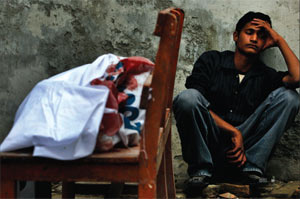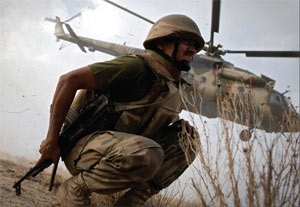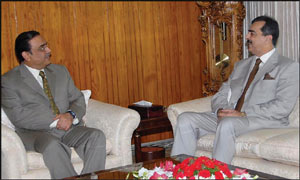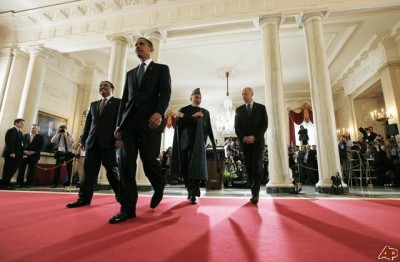Thousands of civilians dead, billions of dollars lost and no sense of security. Is Pakistan staring into the abyss? A report from ground zero
By Saeed Minhas
 IS THIS country at war?” asked my 10- year-old, bluntly. “I saw a Pathan with a suspicious bag go into my school yesterday. I won’t go to school!” piped up my seven-year-old. These questions and remarks, which were no less sharp for the innocence of the questioners, stung all the more because the previous day, Islamabad’s very own Islamic University had been the target of a suicide bomber.
IS THIS country at war?” asked my 10- year-old, bluntly. “I saw a Pathan with a suspicious bag go into my school yesterday. I won’t go to school!” piped up my seven-year-old. These questions and remarks, which were no less sharp for the innocence of the questioners, stung all the more because the previous day, Islamabad’s very own Islamic University had been the target of a suicide bomber.
A few days later, the market in Peshawar was ablaze after a powerful blast left 100 dead. The targets were helpless women and children. More women and children sat glued to the television, watching raging fires consume the bazaar. Death and destruction are routine topics of discussion in every household. In my home, I was asked, “Why can’t we leave the country?” Like many other Pakistanis, I kept silent. Where can we possibly go? As bearers of green passports, we are viewed across the West as carriers of terrorist flu. For most of us, there is little escape, particularly when the Prime Minister and the President seem to be prisoners themselves, jailed by the security swathing them. After Interior Minister Rehman Malik’s warning that educational institutions could be targets, for the first time perhaps, a shutdown of the entire educational system was ordered. Those few institutions that dared to stay open after the Islamic University attacks soon closed their doors after the Peshawar carnage.
The latest series of blasts from October 10 to October 28 were no different from many others except for the fact that they were targeted at students and civilians. As televisions switched to live coverage from the scenes of these crimes, a palpable sense of insecurity spread across the land. I could see the shock and fear written large over my wife’s face. When I left the apartment for a five-minute drive to the supermarket, the roads were deserted. However, the drive took a good 45 minutes. Islamabad, the capital, is now a high-security zone. Each road is choked with security pickets and hemmed with razor concertina wire. The supermarket is stripped bare of its usual crowds and the shopkeepers wear a uniform of despair. They too, hurry to down shutters.
As the military is striving to wipe out insurgents from South Waziristan, the Mecca of world terrorism, political chaos, economic turmoil and a deliberate shift in the terrorists’ targets from security forces to civilians has virtually brought the country to a standstill. A massive trust deficit between the masses and the ruling elite, between the political and military establishments and between the judiciary and the government is compounded by dwindling economic activity and the flight of financial and human capital.
The recent blasts in Peshawar (October 28) and Rawalpindi (November 02), which killed over 35 outside a bank, show a strategic shift on the part of terrorist outfits. Earlier in the month of October, the attacks on the General Head Quarters (GHQ) of the Pakistan Army, police training centres in Lahore and 75 other bombings during 2009 were enough to terrorise the civilians. But since the start of the South Waziristan operation, blasts at public places targeting innocent civilians have wrought such fear in the minds of Pakistanis that normal life seems a distant dream. The tools of security forces — concrete barricades, scanners and metal detectors — are everywhere, but the feeling of security is lacking. Though the ISI and the Army are officially trying to distance themselves from the jihadis, what remains obvious is that though the top brass of the Army has managed to distance itself from its erstwhile pro-Taliban image, the powerful ISI remains highly infatuated with these elements — the reason why the operation against the Tehrik-e-Taliban Pakistan (TTP) insurgents is being supervised by Military Intelligence and not the ISI.
According to official figures, in the last five years, the Pakistan economy has suffered a loss of over Rs 2,080 billion, while inflation has grown by over 35 per cent and unemployment by over 17 per cent. Despite getting US $ 11 billion during the Musharraf regime and an annual logistical support fund of almost US $ 1.5 billion, the Pakistani economy has gone from bad to worse. Since 2001, according to official figures, almost 100 drone attacks and 260 suicide bombings have claimed the lives of over 28,000 civilians, while 300 terrorists including 15 most-wanted targets have been killed. But the war is reaching out in less direct, but no less deadly ways. Even in semi-urban and urban centres, food insecurity has become alarmingly high. Every household wants to know: whose war this is? Why are we fighting this war against terrorism? Who is going to control this jihadi Frankenstein’s monster? On top of — or perhaps because of — these unanswered questions haunting the nation, various interest groups like businessmen-politicians, landlord-politicians, militant supporters and media have banded together into cartels, to protect their interests. This has further alienated the common person.
 The national media is multiplying the confusion by spreading all sorts of conspiracy theories and rumours, thus proving their influence to the other cartels. Some media tycoons boast that there are only two forces in the country: the Chief of Army Staff and the other, the Chief of Media Staff. They claim they can decide the fate of any issue or government.
The national media is multiplying the confusion by spreading all sorts of conspiracy theories and rumours, thus proving their influence to the other cartels. Some media tycoons boast that there are only two forces in the country: the Chief of Army Staff and the other, the Chief of Media Staff. They claim they can decide the fate of any issue or government.
OPERATION RAAH-E-NIJAT
On November 2, the Pakistan Army announced that they had taken control of some main centres of the TTP in South Waziristan and assured the nation that the militants’ main stronghold of Sararogha would fall in the next few days. For weeks, more than two divisions of the army have been deployed in one of the most treacherous battlegrounds against an estimated 7,000 to 10,000 militants, including Uzbeks, Tajiks and Arabs. Supported by more than two dozen F-16s, choppers, heavy artillery and American drones launched from Pakistani soil, the several militant hideouts are reported destroyed.
As the militants vacate areas targeted by bombs, drones and artillery, they focus, instead, on the vulnerable urban clusters of Pakistan. One should expect more destruction from them in the coming weeks and months. With the harsh Waziristan winter drawing near, those familiar with the area believe that as mountainous areas become impassable, the army might have to halt its advance by mid-November. Independent sources confided to this journalist that due to the total lack of surprise, most Taliban or terrorists have melted away to safer havens to “live to fight another day”.
A tribal malik (leader) from Waziristan who lives in Islamabad said on condition of anonymity that most militants have fled from South to North Waziristan because, under the terms of a 2007 agreement between the army and the North Waziristan tribes, no army operation will be conducted there. “If pushed, the militants will move to Kurram, Khyber, Mohmand, Orakzai and Bajaur agencies or will cross over to Afghanistan. In fact, many have already gone to Southern Punjab, Karachi and Balochistan, where they find lots of sympathisers amongst banned outfits such as the Sipah-e- Sahaba, Lashkar-e-Taiba and Lashkar-e- Jhangvi,” said the malik.
“A large number of foreigners have settled down in tribal society. Most are married to locals now and have a family network of their own. How can they be expelled after 30-odd years?” asked another malik.
SPLINTER GROUPS EMERGING
Another tribal elder questioned the commitment of the political government: “Smaller groups like Mangal Bagh’s, which operates in the semi-urban areas of Khyber Agency and controls a lot of the lucrative trade routes to Afghanistan are still active in the area despite the operation. Moreover, Mangal Bagh is running his own FM radio station, from which he airs anti-government statements daily and threatens locals with slaughter and suicide bombers if they cooperate with the state. If the government cannot even shut down his radio station, how can people in the area turn against him?” Another elder spoke up hesitantly, “Everyone in the area knows where Mangal Bagh can be found. Yet, he is still there and still operational.”
“It’s going to be a long battle. Without a working local political and administrative structure, I wonder how the army will operate effectively against them or even diminish the fear of the militants among the populace,” mused a senior malik. This sentiment is borne out by the facts. Almost all the cabinet members of the ANP-led government of NWFP province, the MNAs and Senators elected from FATA seats and political bigwigs such as Salim Saif Ullah (PML-Q), Aftab Sherpao (Former Interior minister of in the Musharraf regime), Asfand Yar Wali (ANP) have fled their homes and have moved to Islamabad. When elected representatives from the region were asked to comment on the situation, none would speak on record. All of them felt that since they had not been taken into confidence either before the doomed peace deal with the TTP or the operation that followed it, there was no reason to “stick their necks out” in this situation.
WHERE IS THE GOVERNMENT?
The closure of schools, the blockade of roads and the creation of red alert highsecurity zones has led people to question if the government has any strategy for the broader conflict or if it is preoccupied with its own security. Political chaos and emotive non-issues are being highlighted in the media instead of real issues, so as to destabilise the government. With the PMLQ, the MQM and the PPP government tussling over the adoption the National Reconciliation Ordinance, a law that would give amnesty against massive corruption charges to certain politicians, there is a pervasive sense that there is no single decision-making body in control of the country. There appear to be six power centres operating simultaneously — and discordantly — in the country. The military, which has been in power throughout most of Pakistan’s history, is certainly the most feared force, with its myriad intelligence wings. On the political front, President Zardari is directly interacting with the cabinet members, irking Prime Minister Gilani. As Gilani knows Zardari happens to be his party chief, he prefers to work with the chief minister of Punjab, Shahbaz Sharif of the PML-N. The PML-N and an erstwhile ally of the PPP, Altaf Hussain’s MQM are vociferous opponents of the NRO, which Zardari has been supporting. And ever since the triumphant Long March of March 2009, Chief Justice Iftikhar Mohammad Chaudhry has become another player in the power game. Though he has failed to take up all-important cases such as those of missing persons, he seems to have started running the government from the Supreme Court, by directing the parliament to review more than 27 ordinances issued during the Musharraf regime including the infamous NRO and has even gone so far as to fix the prices of sugar and flour.
HILLARY’S CHARM OFFENSIVE
 The three-day visit of US Secretary of State Hilary Clinton is the most meaningful diplomatic offensive undertaken by the US since the start of war on terror. In the wake of the controversy over the Kerry- Lugar Bill, Clinton managed to reach out and convey a clear message not only to the masses but to all the power centres in Pakistan that US is here to stay. Her 3D message — diplomacy, development and deterrence — was aimed at tripling the development and diplomatic staff in the country, providing for the deployment of over 4,000 Blackwater personnel in and around Islamabad, ensuring that new US installations in Tank (NWFP) and Jeewani (Balochistan) remain intact and, above all, ensuring that the army should continue its offensive against the militants, thus taking the heat off the US army and help them form an exit or safe-stay strategy in this region. She also hinted at helping improve ties between archrivals India and Pakistan by pressing for a trade-first option to normalise relations between the two nuclear neighbours. With so many power players and so many conflicting interests, when will the militancy be defeated? Will it ever be defeated? The answer remains elusive and it is this elusiveness that is driving the suicide bombers.
The three-day visit of US Secretary of State Hilary Clinton is the most meaningful diplomatic offensive undertaken by the US since the start of war on terror. In the wake of the controversy over the Kerry- Lugar Bill, Clinton managed to reach out and convey a clear message not only to the masses but to all the power centres in Pakistan that US is here to stay. Her 3D message — diplomacy, development and deterrence — was aimed at tripling the development and diplomatic staff in the country, providing for the deployment of over 4,000 Blackwater personnel in and around Islamabad, ensuring that new US installations in Tank (NWFP) and Jeewani (Balochistan) remain intact and, above all, ensuring that the army should continue its offensive against the militants, thus taking the heat off the US army and help them form an exit or safe-stay strategy in this region. She also hinted at helping improve ties between archrivals India and Pakistan by pressing for a trade-first option to normalise relations between the two nuclear neighbours. With so many power players and so many conflicting interests, when will the militancy be defeated? Will it ever be defeated? The answer remains elusive and it is this elusiveness that is driving the suicide bombers.
(The article first appeared in The Tehelka Magazine)

 They also believe the fall of Kabul would provide al-Qaida once more with an expanse of territory from which to plot new attacks on the west on the scale of September 11.
They also believe the fall of Kabul would provide al-Qaida once more with an expanse of territory from which to plot new attacks on the west on the scale of September 11.









